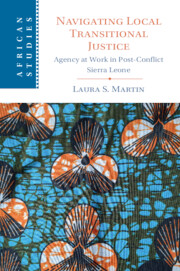Book contents
- Navigating Local Transitional Justice
- African Studies Series
- Navigating Local Transitional Justice
- Copyright page
- Dedication
- Contents
- Maps
- Acknowledgments
- 1 Agency in Times of Transitional Justice
- 2 Navigating Violence, Peace and Justice
- 3 Deconstructing Fambul Tok’s Discourse and Practice
- 4 Participant Experiences with Fambul Tok’s Program
- 5 Unrecognized Mechanisms, Normality and Everyday Realities in Transition
- 6 Activating Justice
- Appendix A: Informant Interview List
- References
- Index
- African Studies Series
1 - Agency in Times of Transitional Justice
Recognized and Unrecognized Mechanisms “at Work”
Published online by Cambridge University Press: 13 July 2023
- Navigating Local Transitional Justice
- African Studies Series
- Navigating Local Transitional Justice
- Copyright page
- Dedication
- Contents
- Maps
- Acknowledgments
- 1 Agency in Times of Transitional Justice
- 2 Navigating Violence, Peace and Justice
- 3 Deconstructing Fambul Tok’s Discourse and Practice
- 4 Participant Experiences with Fambul Tok’s Program
- 5 Unrecognized Mechanisms, Normality and Everyday Realities in Transition
- 6 Activating Justice
- Appendix A: Informant Interview List
- References
- Index
- African Studies Series
Summary
This chapter provides the core argument and engages with concepts and theories relevant to the book. It begins with a comprehensive literature review of the turn to the local within transitional justice. While local transitional justice mechanisms are supposed to better align with the needs and priorities of affected populations, often these programs are measured against their own goals, or normative expectations of transitional justice, which overlooks how individuals and communities navigate these programs in multiple and diverse ways. This book examines different types of agency of Sierra Leoneans in what I refer to as recognised and unrecognised local transitional justice processes. Using Fambul Tok as an example of a recognised local transitional justice program, the book explores how various types of agency are involved in constructing and shaping local TJ programs, often resulting in a range of unintended consequences. This book builds upon scholarship in a range of disciplines including peace and conflict studies, anthropology, development, politics and social and legal studies. Ultimately, the book argues that justice does not happen to or for people, but that is an act in and of itself. It illustrates how local programs and processes actually work in practice.
Keywords
- Type
- Chapter
- Information
- Navigating Local Transitional JusticeAgency at Work in Post-Conflict Sierra Leone, pp. 1 - 31Publisher: Cambridge University PressPrint publication year: 2023

